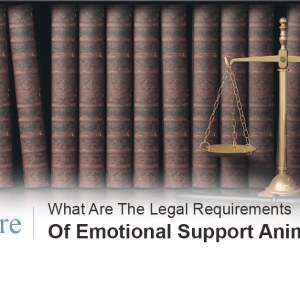Emotional Support Animals and FHA
Fair Housing Act, Section 5 Recognizes an Emotional Support Animal as an Assistive Aids
The Fair Housing Act (FHA) was created to prevent discrimination when people are looking for housing and during the tenancy. Both mental and physical disabilities are covered under the FHA as long as they affect the person’s daily life and activities. Many disabled people find that an animal can be of assistance to them, by providing tasks or even just emotional support. The FHA considers emotional support animals (ESAs) to be assistive aids to people with disabilities because of the support they provide for their owners. Because of this legal distinction, ESAs are given more rights than a typical pet and harsh consequences may ensue for people who discriminate against those who need them.
Improve your mental health by keeping your ESA pet close by – Get your ESA certification today!
What Protections Does the FHA offer?
The most important protection the FHA offers is discrimination. It can be difficult to find pet-friendly housing. When it does exist, it often requires steep deposits and additional fees and includes exhaustive breed exclusion lists. Though this makes living with a pet difficult for all animal lovers, it puts those who depend on an ESA for their well-being at an unfair disadvantage and can be considered discrimination. When a person needs their pet to live a more functional life, it is unfair to deny them housing in any form or charge additional fees for their animal.
The FHA makes it so that landlords and property managers cannot deny housing to ESA owners because of their pets. It also prevents them from charging additional fees for ESAs to be given residence and waives any breed or weight restrictions that may exist. This makes housing as accessible for people with mental disabilities as it is for people without them, and so ESA owners don’t have to compromise their mental health to find housing.

ESA Letter
The FHA protects ESA owners in the following ways:
The FHA ensures that ESA owners will never be at a disadvantage when they are in need of housing due to their pets. It helps level the field so that they do not have to choose between their mental health and safe, secure housing. The FHA is upheld at the federal level, which means that ESA owners do not have to worry about the differences between the states and they are protected regardless of region.
Additionally, the FHA stands as a legal backbone in cases of discrimination. If an ESA owner is unfairly denied housing because of their animal, they can easily file a complaint with the U.S. Secretary of Housing and Urban Development who will help navigate the legal process and make the situation right. If you are an ESA owner and feel that you have been unfairly denied housing, the FHA will ensure that you are not taken advantage of and have access to all of your rights.

Types of ESA
Warnings for ESA Owners
It is important to know that an ESA letter is not valid for life; it does have to be renewed regularly. Your Licensed Mental Health Practitioner (LMHP) would want to re-evaluate your mental well-being and determine whether or not an ESA is still an effective part of your treatment program. Additionally, landlords will often require an updated ESA letter yearly along with a lease renewal
Though ESAs are entitled to more rights than regular pets, those rights do come with a certain amount of responsibility. When a landlord allows an ESA to live with its owner (especially when a “no pets” policy is in effect), they assume that the animal is well behaved and safe. If your ESA is dangerous or unruly, the ESA title may be revoked along with any protections that come along with the FHA. It is important that your ESA knows basic obedience commands so that you can continue living with your animal worry-free.
It is also important to be wary of dishonest ESA “registration” services. In order for an ESA to be legitimate, it must be prescribed in a letter written by an LMHP. There is no national registry, so do not give out your personal information or pay for services that cannot prove your authenticity. Be sure to check the credentials of the LHMP that writes your letter and ensure they are licensed to practice in your state. Illegitimate ESA letters, even when the need for an ESA is real, do not provide any protection or rights for ESA owners.
An ESA pet can improve your lifestyle – Click the button below.
Fair Housing Act Helps Owners Live with their ESAs W/o Problems
ESA owners have the right to live their lives with the resources necessary to ease as much hardship as possible. No one should ever have to choose between their mental health and housing, so the FHA ensures they won’t. It helps people with disabilities find housing without having to worry about making accommodations or sacrifices because of their ESA. As long as the ESA is well-behaved and the letter is legitimate, owners should have no problem finding housing regardless of any “no pets” policies that may exist.
Book an Appointment with ESACare, do not hesitate to contact us.










 347 5th Ave Suite 1402-112,
347 5th Ave Suite 1402-112,

Leave a Reply
Want to join the discussion?Feel free to contribute!